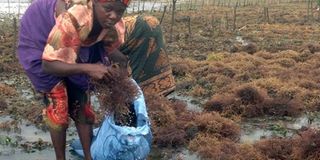Lamu fishermen asked to embrace seaweed farming

Tima Mohamed harvests seaweed at Kibuyuni sea farm next to the Indian Ocean. PHOTO | LABAN WALLOGA | NATION MEDIA GROUP
Fishermen affected by dredging activities at the Lamu port project have been asked to embrace commercial seaweed farming to supplement their earnings from the Indian ocean.
The livelihoods of at least 5,000 fishermen were affected when their key traditional fishing channels were closed off to allow for construction of the port in Kililana.
For the past four years, the fishermen have been pursuing their Sh1.76 billion compensation package from the state so that they can engage in other activities to support their families.
Pate Marine Community Conservancy (PMCC) officials asked them to consider venturing into seaweed farming as an alternative source of income as they wait for their compensation cash.
The conservancy’s objective is to increase income and employment for residents through conserving key habitats such as mangroves, seagrasses, coral reefs, rare and threatened species such as sea turtles, seabirds, dugongs, dolphins, and sharks.
The conservancy’s manager, Nadhir Hashim, revealed that the organisation was already training fishers, including women, on how to get into commercial seaweed farming.
Mr Hashim noted that, apart from creating jobs for fishers, seaweed farming can also help in decreasing habitat destruction and unsustainable fishing practices, conserving Lamu’s cultural heritage, and increasing social and ecosystem resilience to climate change.
He said fishermen and locals have a chance to improve their lives through seaweed farming, which can be easily and comfortably done in Lamu with handsome returns.
The conservationist cited Shimoni in Kwale where locals have also been earning millions through a similar venture and asked fishermen who are knowledgeable about the sea to change gears and try their luck at seaweed farming.
"It’s time for our people to try out seaweed farming. People of Shimoni in Kwale can tell you just how fruitful that venture is. Look at Zanzibar - the country makes millions annually just through seaweed farming. It’s time for our local fishers to consider this as an alternative livelihood,” he said.
Mr Abdalla Aboud, a fisherman in Lamu, said they were ready to embrace such a venture provided well-wishers come out and assist them in the undertaking.
Mr Aboud, however, called on the state to speed up the release of their Lapsset compensation, saying it is long overdue.
“It’s unfortunate that since 2018, when the Malindi High Court ordered the state to pay us the Sh1.76 billion, nothing has materialised,” he said.
“As we try out seaweed farming, the state should still speed up the release of our compensation cash and also provide us with all the necessary assistance to smoothly transition into other ventures and be able to continue earning a living.”
Mr Athman Bahero, of Mtangawanda, said business at the port had pushed local fishers to be flexible.
“We are open to change. We are ready to adopt alternative income-generating ventures like seaweed farming provided someone holds our hands,” said Mr Bahero.





